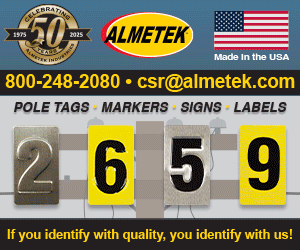Many electric utilities use private Federal Communications Commission (FCC) radio licenses to support daily operations, including Supervisory Control and Data Acquisition (SCADA) systems, Multiple Address Systems (MAS) and Automatic Meter Reading (AMR). Electric utilities operating private FCC radio licenses must also ensure that these operations remain compliant with the rules and regulations of the FCC. This article outlines the Commission’s enforcement procedure and provides general guidance to promote compliance with FCC rules. It is not an exhaustive list of potential enforcement actions, but instead identifies common FCC enforcement proceedings brought against electric utilities and other private licensees.
For example, an electric utility in Minnesota held four FCC radio licenses that expired in July 2004. The utility continued to these stations after the expiration date and requested that the licenses be reinstated in October 2006. In April 2007, the FCC’s Enforcement Bureau issued a Notice of Apparent Liability proposing a fine of $20,800 against the utility for operating under expired licenses. The utility eventually paid $16,000 to settle the case.
The plight of this co-op is not an aberration. Electric utilities and other private FCC licensees have become increasingly ensnared in a variety of FCC enforcement proceedings initiated under the Commission’s authority in 47 U.S.C. § 503 and 47 C.F.R. § 1.80. In 2007, the Enforcement Bureau levied a record-breaking $43 million in fines, forfeitures and monetary settlements entered into through consent decrees. The Bureau was on pace to surpass this total in 2008.
Enforcement Procedure Overview
In light of the Commission’s increased emphasis on enforcement actions, it is critical for all licensees to understand the agency’s enforcement procedures. The FCC’s Enforcement Bureau typically initiates investigations after receiving a complaint, through an inspection of its own, or by a referral or as a result of a voluntary disclosure. After an investigation is initiated, the Bureau frequently contacts the subject of the investigation regarding any alleged rule infraction by issuing either a Citation or a Letter of Inquiry (LOI).
A Citation is issued to an entity that does not hold and has not applied for any FCC licenses, permits, certificates or other authorizations and alleges the recipient violated an FCC rule. Generally, the Commission does not impose a fine (also known as a “forfeiture”) upon the recipient of a Citation unless the recipient continues to violate the Commission’s rules after receipt of the Citation or engages in activities for which an FCC license, permit, certificate, or other authorization is required but was not obtained.
An LOI is issued to an FCC applicant or licensee and poses questions to company officials to elicit information and supporting documentation regarding an alleged rule violation. The recipient of an LOI is generally given 30 days to respond and usually can request an extension if additional time is needed.
If after reviewing the response to an LOI the Bureau believes that a violation has occurred, it may decide to discontinue the investigation and take no action, issue a Notice of Apparent Liability (NAL) or negotiate a Consent Decree with the recipient. A NAL alleges that a rule violation has occurred and finds the recipient apparently liable for a fine or penalty. The recipient of an NAL may pay the penalty or request that the penalty be reduced or dismissed.
A Consent Decree is a voluntary settlement between the entity and the FCC resulting in a finding of no wrongdoing and usually requiring the licensee or applicant to make a “voluntary” monetary contribution to the United States Government and to implement various corrective measures looking toward future compliance. (The co-op identified in the introduction entered into a Consent Decree and “voluntarily” contributed $16,000 to the U.S. Treasury as a result of its apparent operation of expired FCC licenses.)
The Commission computes the amount of a proposed penalty by following the baseline amounts contained in its Penalty Policy and recent decisions in similar matters while increasing or decreasing the proposed forfeiture or settlement amount depending on the presence or absence of various aggravating or mitigating factors.
A forfeiture amount may be increased if the Commission finds egregious misconduct; an intentional violation; substantial harm; prior violations of any FCC requirements; or a repeated or continuous violation. A forfeiture amount may be decreased if the Commission finds a minor violation; good faith or voluntary disclosure; history of overall compliance; or inability to pay.
The statute of limitations prohibits the Commission from imposing a forfeiture penalty for violations that occurred more than one year prior to the date of issuance of an NAL. However, the FCC may consider apparent violations committed more than one year prior to this issuance of an NAL when calculating an appropriate forfeiture amount for violations that occurred within the one-year period.
Following the issuance of the NAL, affected licensees or applicants are provided a reasonable period of time, generally 30 days, to respond and demonstrate why the forfeiture should not be imposed or should be reduced. If an enforcement matter is not resolved through payment of an NAL or a Consent Decree, the Commission may issue a Forfeiture Order requiring the fine to be paid in full or in part or canceling the proposed fine.
A licensee’s or applicant’s refusal to pay a Forfeiture Order cannot be used against the licensee or applicant in any future proceedings at the FCC. The FCC also has no authority to collect unpaid forfeitures on its own. Rather, unpaid Forfeiture Orders may be referred by the FCC to the Department of Justice (DOJ) for collection. The DOJ, in its discretion, may elect to file a civil suit to collect the fine in the district where the recipient has its principal operating office.
The suit will be a “trial de novo,” meaning the DOJ cannot rely on the facts or legal findings in the FCC’s Forfeiture Order but must prove the case on its own as if it were a “new” case. As a result, the FCC usually only refers to the DOJ for collection particularly egregious enforcement matters or ones involving serious issues of public policy.
Protecting Your Company
In light of the Commission’s increased focus on enforcement, sound business practices require that your company be in compliance with all applicable FCC requirements. To promote compliance with the rules, private licensees should periodically review their physical facilities and compare them with all active FCC licenses. Any discrepancy between actual and licensed operations should be quickly corrected.
Mergers and acquisitions can also raise unique licensing issues at the FCC and require heightened awareness by all parties (See Inset). Only by closely tracking all FCC license assets and licensing requirements can companies involved in mergers and acquisitions ensure compliance with applicable FCC requirements.
A private licensee also should be prepared to investigate and promptly respond to all Commission inquiries. Private licensees having substantial investments in land mobile and microwave systems should establish an internal procedure to ensure that appropriate personnel are apprised of citations and LOIs so that internal reviews may be conducted, corrective measures may be taken, and a complete response to the citation or LOI may be timely filed with the Commission.
About the Author
Wesley K. Wright is an Associate at Keller and Heckman LLP. Mr. Wright joined the firm in 2006 and practices in the areas of telecommunications and transactional law. His telecommunications practice focuses on assisting corporate clients and trade associations with various legal and regulatory matters before the Federal Communications Commission, Federal Aviation Administration, courts and various state agencies. His telecommunications practice involves a variety of telecommunications matters related to private wireless licensing, pole attachment issues and FCC enforcement matters. Mr. Wright can be reached at (202) 434-4296 or wright@khlaw.com.







